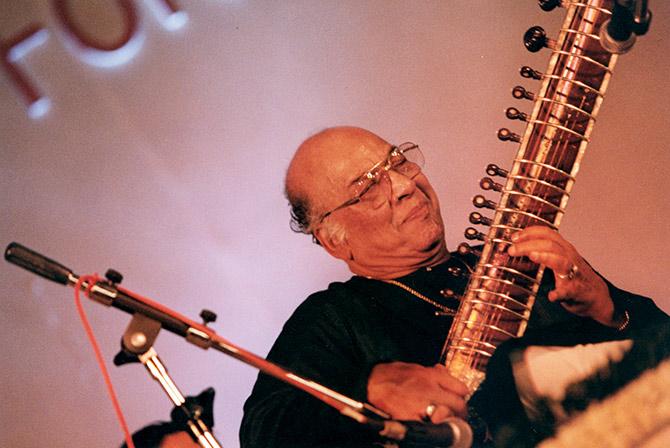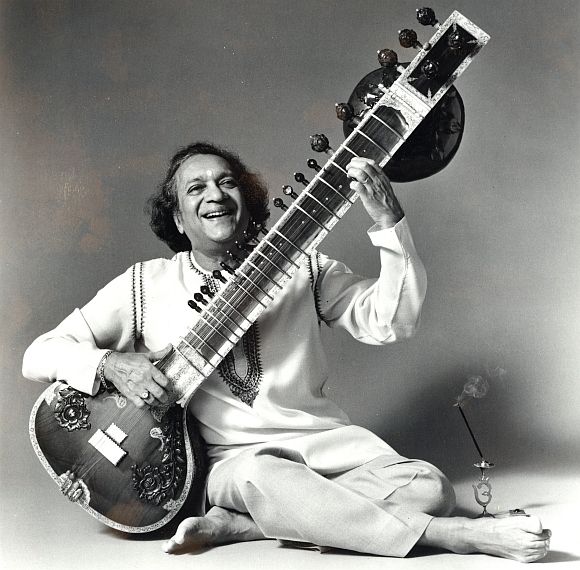At some point, it became evident to the audience that a subtle musical duel was taking place.
By the time the faster taans started, the notes had become sharp arrows shot with the intention to annihilate.
A revealing excerpt from Namita Devidayal's The Sixth String Of Vilayat Khan.

1952, Delhi. It had been five years since Independence and India was still in the mood for celebration.
Two young string musicians were performing together at the Constitution Club grounds -- a sitar player called Ravi Shankar and a sarod player whose name was Ali Akbar Khan.
Both were in their early thirties and students of Baba Allauddin Khan, an ambidextrous musician with a goatee, famous for his genius and his temper.
The concert was part of the Jhankar Festival. There was tremendous anticipation around this particular performance and the music fraternity had been buzzing for days.
Ravi Shankar had already astonished the world by creating an orchestra for the new All India Radio. Ali Akbar, who happened to be baba's son, was emerging as one of the most refined musicians of his generation.
Accompanying them that evening were two tabla masters from Banaras, Kanthe Maharaj and his nephew Kishan.
A covered stage had been constructed on the grounds. The musicians walked up, one behind the other, all wearing white. While they were tuning their instruments, a young man in a black kurta and rimless glasses suddenly appeared in front of the stage, clutching his sitar.
He addressed the audience in beautiful Urdu. 'This stage has so many gorgeous flowers. I would like to add my fragrance by joining my friends Robu-da and Alu-da this evening'.
A murmur of surprise went around the audience. The performance was meant to be a duet. Who was this? Although he spoke poetically, this man had the air of a human detonator.
He held his instrument as if it were a weapon, pointing it at phantom enemies. His eyes blazed behind the glasses he wore.

Some recognised him as Vilayat Hussain Khan, the son of Enayat Hussain Khan. A few people started cheering.
Baba Allauddin Khan gestured angrily from the front row, trying to stop the duo from becoming a trio, but by then the audience had already expressed its excitement over the intervention and it was too late.
The young man jumped onto the stage and the other musicians made space for him.
Baba walked up to the stage and growled at all three: 'Remember, you are all my children. Play with love and respect.'
It was a formidable stage. Ali Akbar sat in the centre, looking vaguely daunted. On either side of him sat the two sitar players, both strikingly good-looking men with large foreheads suggesting grand destinies.
Kanthe Maharaj was on one side of the stage. Kishan Maharaj sat on the other side, kneeling in his distinctive manner, as if he were doing namaz.
Two grand Miraj tanpuras at the back and two Chicago Radio mikes in front -- it was a picture of perfect melodic symmetry.
In the front row sat the undisputed heads of the music world and Delhi's wealthiest patrons, including the Shriram-Shankarlal family.
The men were dressed in stylish achkans or suits, the women in gorgeous Banarasi silk saris. They rustled. They coughed. The master of ceremonies introduced the musicians.
Ravi Shankar made the customary gesture asking for permission to begin. He then struck the notes of raga Manj Khamaj.
He played for a few minutes then turned to Vilayat Khan, giving the cue. The younger musician played the same riff, but in a more lilting style.
They meandered through the alaap for almost an hour, building gradually, thoughtfully, teasing the ma, the raga's dominant note, the manj in the Khamaj.

At some point, it became evident to the audience that a subtle musical duel was taking place. By the time the faster taans started, the notes had become sharp arrows shot with the intention to annihilate.
Ali Akbar Khan hardly got to play, so after a while he quietly put his sarod down and looked bewildered. His head turned from left to right and right to left as the sharpshooters on either side battled on.
At one point, Ravi Shankar hit a set of high notes in the third octave. Like a kite catching its prey, Vilayat Khan scooped up the lid of his little metal oil box and, instead of using his fingers, pressed it on the strings of his instrument.
The sound that emerged, of amplified metal on metal, was audacious and amazing.
Suddenly, Hafiz Ali Khan got up from his seat and applauded. 'Maar daala!' (He killed him!) Others sitting next to him cheered.
Baba Alauddin Khan also jumped up and started shouting. 'You have defamed my boys, shuorer baccha (you son of a pig), you scoundrel,' followed by even choicier expletives in Bengali.
The music stopped abruptly.
Twenty-four-year-old Vilayat Khan was declared the winner in the battle of the sitars. He had clearly taken liberties with the music, and even gone a little beyond the parameters of the raga, but he had created an impact.
Ravi Shankar did not look pleased. This brash and brilliant musician, seven years younger than him, had humiliated him in public. He quietly got up and left the stage.
The epic concert was discussed by Delhi's music world for days afterwards. Who was this Vilayat Khan, the long-lost son of Enayat?
Some weeks later, Ravi Shankar invited Vilayat Khan and Ali Akbar to the radio station to listen to his new orchestra, Vadya Vrinda.
They complimented him for integrating elements of Western harmony into Indian music. Afterwards, they all sat in his cabin and had tea with fresh samosas.
Ravi Shankar said, 'Vilayatbhai, this should never happen again.' Vilayat replied, 'I agree, Robu-da.'
The two musicians promised each other they would never perform together.
Kishan Maharaj later told someone, 'If these two eyes of India play together again, one will shut for ever.'
In some ways, the concert may have changed their lives.
These two artistes established the sitar as the most popular instrument in India, but their approach to music took two very different directions.

Ravi Shankar became a brilliant collaborative artiste who played with the Beatles, Yehudi Menuhin and many others. He was the international star.
Vilayat Khan did not achieve the same rock star status, but his music was revolutionary. He transformed the acoustics of the sitar, coaxing it to sing like the human voice.
Ravi Shankar's fame cast a shadow on Vilayat Khan's life, it is hard to deny, but he held onto his aesthetic certainties and stayed true to his music.
He consciously avoided what he viewed as titillating populism. Over the next fifty years, Khansahib carefully crafted his personality and his music to become one of the most remarkable creative expressors of the twentieth century.
Was Ravi Shankar more popular than Vilayat Khan?
Excerpted from The Sixth String Of Vilayat Khan by Namita Devidayal with the kind permission of the publishers, Westland Publications Ltd.








